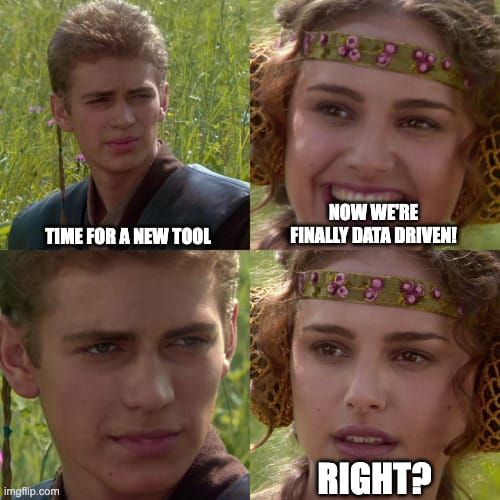Stop chasing tools and focus on business value. You've heard it a thousand times. So has every data team. We nod, agree, and then... buy another tool. Why? Because the tool obsession is a symptom of something deeper. We don't need better discipline. We need a better way.

There seems to be a certain style of post. They get thousands of likes on LinkedIn.
"Stop chasing shiny tools and focus on business value."
"Data teams need to do the hard work, not play with new tech."
"Governance, not gadgets. Strategy, not software."
Everyone nods along. The comments fill with agreement. Nothing changes.
These posts are right in theory but useless in practice. It's like telling someone with chronic back pain to "just stand up straight." Thanks. Really helpful.
I've watched this play out for years now. Smart, dedicated data professionals read these posts, agree with them, genuinely try to focus on business value and foundational work. And they still end up frustrated, still end up with executives who don't trust the data, still end up fighting the same fires they were fighting two years ago.
What the heck is going on here?
When you see the same behavior repeated across hundreds of companies and thousands of data professionals, it's not a character flaw. It's not laziness or lack of focus. It's a signal.
The tool obsession is actually data teams intuiting something important: the methods and frameworks we've been handed don't actually work, even when you do everything right.
Where are all the companies where data just works? Where the majority of people can actually answer their own questions? Where governance isn't a constant battle? Where data isn't siloed across seventeen different systems? Where every non-reporting use case doesn't end in frustration? Where change isn't feared but embraced?
They don't exist. Or they're so rare that we write case studies about them like they're unicorns.
I know too many brilliant, hardworking data professionals to believe this is an execution problem. These people care deeply about their work. They read the books. They attend the conferences. They genuinely try to focus on business value. And yet.
I believe this is why data teams fixate on tools. Not because they're distracted or naive, but because vendors have gotten incredibly good at tapping into a very real desperation.
Every new tool promises the same thing: this time it'll be different. This one will finally democratize data access. This one will solve governance without creating bottlenecks. This one will break down the silos.
The pitch speaks to something data professionals feel in their bones. This sense that there has to be a better way. That it shouldn't be this hard.
But the tools don't deliver. They can't, because they're trying to solve a problem without addressing deeper issues with how we even think about our data systems.
The uncomfortable reality is this: we don't actually have a proven playbook for making data work at scale in complex organizations.
We have best practices, sure. We have frameworks and methodologies. We have plenty of advice about focusing on business value.
But "focus on business value" isn't a strategy. It's like telling someone to "score more points" in a game where the rules keep changing and half the players don't agree on what the goal is.
The reason these LinkedIn posts feel like eating your vegetables is because they are. They're generic advice that assumes the problem is motivation or prioritization. But vegetables only work if your digestive system functions properly in the first place.
We need to stop pretending this is a people problem and start acknowledging it's a methods problem.
The fact that tool obsession is nearly universal across the industry should tell us something. It's not that data teams are doing the wrong things. It's that the entire paradigm we're working within has fundamental limitations.
I don't have all the answers here. But I do know that when the same advice gets repeated for years and nothing meaningfully changes, we need to question the underlying approach itself. That's what we're doing at Matterbeam. Rethinking the fundamentals of how data should work in organizations.
We need new approaches. Different frameworks. Ways of thinking about data that acknowledge the messy reality of how organizations actually work, not how we wish they worked.
The tool obsession will continue until we have better alternatives. Not better tools, but better fundamental approaches to the problems those tools are trying to solve.
Until then, we're just telling people with broken systems to try harder. And that's never been a real solution.